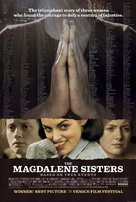Reviews provided by RottenTomatoes
Terry Lawson, Detroit Free Press: A story like this one could easily succumb to outraged melodrama, but not only does Mullan keep the drama human-sized, he even leavens it with the humor that one can easily believe had to be summoned to endure such misguided and malicious treatment. Read more
Rene Rodriguez, Miami Herald: If The Magdalene Sisters occasionally flirts with cartoonishness, the movie is tempered by Mullan's considerable filmmaking skills. Read more
Richard Roeper, Ebert & Roeper: I want people to give this movie a chance, it's one of the best movies of the year I think. Read more
Michael Wilmington, Chicago Tribune: A fierce, brilliant film that breaks (and then mends) your heart. Read more
Stephen Holden, New York Times: The Magdalene Sisters more than fulfills the promise of Mr. Mullan's audacious feature film debut, Orphans. Read more
Jonathan Rosenbaum, Chicago Reader: Grimly believable. Read more
Eleanor Ringel Gillespie, Atlanta Journal-Constitution: Definitely one-sided, but still very powerful. Read more
Ty Burr, Boston Globe: Blistering and brilliant work of true-life moral agitprop. Read more
Kenneth Turan, Los Angeles Times: There is a fundamental air of truth about it, a sense that, horrific though things seem, this is how it must have been. Read more
Lisa Kennedy, Denver Post: Full of forceful, aching performances. Read more
Owen Gleiberman, Entertainment Weekly: The Magdalene Asylums really existed, and Mullan has captured their pious horror with a humanity that burns away any hint of exploitation. Read more
Jane Sumner, Dallas Morning News: An intense expose with bits of acrid humor. Read more
Scott Foundas, L.A. Weekly: Grim, grueling and triumphantly powerful. Read more
Jan Stuart, Newsday: McEwan nails the degenerate blend of humanity and hypocrisy that can coexist when people become slavemasters of moral rectitude. Read more
Stephen Whitty, Newark Star-Ledger: It may well be a stinging attack on the church. But it can also be read as a hymn of praise to the faith. Read more
Jack Mathews, New York Daily News: Offers a kind of worst-case glimpse into the draconian Magdalene Asylums that were begun in the late 19th century and lasted well into the 1990s. Read more
Rex Reed, New York Observer: A great film that deserves genuflection. Read more
Andrew Sarris, New York Observer: Mr. Mullan's fictional treatment of this subject in The Magdalene Sisters has much to commend. Read more
James Berardinelli, ReelViews: This is a worthwhile movie because it is well-made and encourages viewers to think and feel. Read more
Roger Ebert, Chicago Sun-Times: A harrowing look at institutional cruelty. Read more
Andrew O'Hehir, Salon.com: A classic crowd-pleaser, a neo-Gothic tale whose appealing heroines are unfairly oppressed but finally find the strength to set themselves free. Read more
Mick LaSalle, San Francisco Chronicle: A powerful document of cruelty and sadism. Read more
Jeff Strickler, Minneapolis Star Tribune: Although it's heavy-handed in its emotional button-pushing, The Magdalene Sisters still manages to produce all the reactions the filmmakers want: repulsion, indignation, anger and outrage. Read more
Liam Lacey, Globe and Mail: Angry and deliberately provocative, The Magdalene Sisters sets out to offend those who deserve it. Read more
Peter Howell, Toronto Star: Like Phillip Noyce's recent Rabbit-Proof Fence, which exposed similar crimes of mass containment and correction against Australia's Aboriginal people, The Magdalene Sisters is social history told with anger and an agenda. Read more
Claudia Puig, USA Today: One of the most gut-wrenching and expertly told films of the year. Read more
David Rooney, Variety: This drama about a shocking reality from recent history balances a light touch with searing intensity and a sense of moral outrage. Read more
J. Hoberman, Village Voice: Proposes itself as a corrective. Soon after, there's a scene powerful enough to induce a revolutionary conversion. Read more

